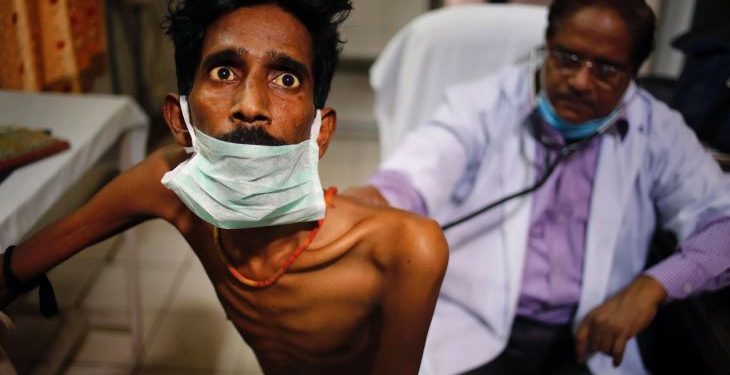London: The COVID-19 pandemic may lead to 95,000 additional tuberculosis (TB) related deaths in India over the next five years, due to disruptions to health services, and delays in diagnosis and treatment, according to a study published on Wednesday.
The modelling study, published in the European Respiratory Journal, found that the COVID-19 pandemic could significantly increase the global burden of TB.
It estimates at least 110,000 additional deaths from TB in India, China, and South Africa unless health services maintained and strengthened.
The researchers from the London School of Hygiene & Tropical Medicine (LSHTM) and Lancaster University in the UK noted that before COVID-19 outbreak, over 4,000 people were dying from TB every day.
They estimated additional TB deaths and cases in China, India and South Africa over the next five years by examining the impact of various reductions in social contacts and on health services due to COVID-19.
They hypothesised that social distancing might reduce TB incidence as Mycobacterium tuberculosis, the bacteria which causes the disease, is transmitted via droplets in the air — similar to the coronavirus.
However, even after taking into account this potential reduced TB transmission, the most likely scenario was estimated to result in more than 110,000 additional TB deaths, according to the researchers.
In the worst case scenario where the impact of COVID-19 on health services is severe, this number could rise to up to 200,000 additional deaths, they said.
The most probable scenario, based on the current information and distancing measures, suggests 6,000 additional deaths could occur in China, 95,000 in India and 13,000 in South Africa, according to the researchers.
“There is concern that the COVID-19 pandemic is resulting in decreased TB clinic attendance, delayed diagnosis and treatment,” said study first author Finn McQuaid, Assistant Professor in Infectious Disease Epidemiology at LSHTM.
“This is especially so in low- and middle-income countries where health services, or access to them, might be substantially disrupted,” McQuaid said.
He noted that early anecdotal information from India, China, and South Africa suggests that the number of people being diagnosed and treated for TB has fallen significantly.
The team measured the effect of these factors on TB incidence and deaths in these three countries which make up about 40 per cent of the global TB cases.
The researchers modelled different scenarios with various implementations of social distancing measures and health service disruption lasting for six months to estimate the impact of COVID-19 on global TB burden.
They found that if there is substantial health service disruption, such as a 50 per cent reduction in TB cases detected and successfully treated, there would be an increase in both incidence and deaths from TB over the subsequent five years, regardless of the level of social contact.
However, if social distancing measures are minimal and there is substantial health care disruption — based on 80 per cent reduction in case detection and treatment success — the model predicts an 8-14 per cent increase in cumulative deaths from TB over the next five years.
“We need to act now to ensure innovative approaches to people-centric TB care are the focus, so that the fight to end this pandemic does not overwrite the hard-won gains made against this disease,” McQuaid explained.
“Given that health service disruption far outweighs the benefit of social distancing, it is crucial to maintain and strengthen TB-related health services during, and after, COVID-19,” he said.
PTI






































